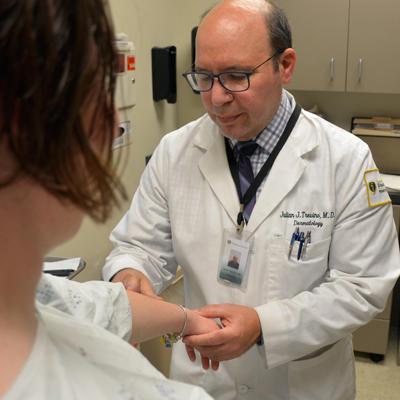Vital Signs » Summer 2018

Julian Trevino, M.D., ’87, has received a lot from the Dayton, Ohio, community. He believes it is part of his duty as a physician to give back.
“I would encourage all physicians, physicians-in-training, and medical students to get involved in projects that enhance the health of their communities,” said Trevino, professor and chair of the Department of Dermatology at the Boonshoft School of Medicine. “The community supports us in our work, so we need to give back to our communities. That is part of our obligation as physicians.”
Each May since 1995, Trevino has acted on his beliefs by directing an annual program providing free skin cancer screenings at multiple locations throughout the Miami Valley. The one-week program coincides with National Skin Cancer Awareness Month, and annually serves more than 500 people. Trevino estimates approximately 11,000 people have been screened in the past 23 years.
“The event provides an opportunity to educate the community about the extremely important topics of skin cancer prevention and detection,” Trevino said. “It simultaneously offers free skin exams to screening participants who might not otherwise have access to dermatologic care.”
It began as a smaller event, but eventually expanded to include Butler, Greene, Miami, Montgomery, and Warren Counties. Participants can have a full-body skin screening, a screening of a limited area, or an inspection of a single spot.
Trevino says that the screenings have revealed atypical moles and melanomas. Precancers as well as basal cell and squamous cell skin cancers also have been found.
“We have detected many skin cancers over the years and directed participants to providers to have those treated,” Trevino said. “In cases where we have detected a melanoma, the screening may literally have saved some lives.”
A fascinating part of dermatology is that many skin diseases have a distinct visual appearance, Trevino says. In many situations, this allows for rapid diagnosis. It’s also possible to ascertain a great deal about an individual’s general health on the basis of their skin exam. Often, patient’s skin conditions can result from underlying medical disease or medications they are taking.
“Skin conditions can have an enormous impact on an individual’s self-esteem and sense of well-being,” Trevino said. “The ability to assist patients in treating their skin conditions and improving their quality of life is an extremely gratifying aspect of being a dermatologist.”
For teens and adults, Trevino recommends avoiding tanning booths. There are cases of melanoma that have been attributed to excess tanning booth use. Trevino says that daily use of a broad-spectrum sunscreen with a sun protection factor of 30 or greater would help to prevent many cases of skin cancer. So, too, would wearing wide-brimmed hats. Avoiding prolonged outdoor activities between 10 a.m. and 4 p.m. also helps to reduce one’s skin cancer risk.
“Many people tell me they often get a burn early in summer, then they tan. I strongly advise to use their sunscreen and skip the burn,” Trevino said. “Every time you get a sunburn, you increase your personal skin cancer risk.”
Infants and children are especially susceptible to the bad effects of excess sun exposure. Parents should be vigilant in monitoring their kids’ time in the sun.
“If parents impart a healthy respect for the sun early on in their children’s lives, they will definitely have an impact in reducing that child’s lifetime risk for skin cancer,” Trevino said.
Reducing the community’s skin cancer risk and early detection or treatment of skin cancers are at the core of the ongoing area-wide free skin cancer screening program.
Trevino’s work as a faculty member, teaching and training medical students, began in 1994, the year he graduated from the medical school’s Dermatology Residency Program. He sees patients at Wright State Physicians Dermatology offices in Fairborn, Ohio, and Tipp City, Ohio, and the Dayton Veterans Affairs Medical Center (VAMC). He is program director of the medical school’s Dermatology Residency Program.
Over the years, he has served as chair of the Department of Dermatology. Trevino has also served as chief of dermatology and chair of the Medical Quality Council for the Dayton VAMC. He provides care to patients as part of Wright State Physicians, the Boonshoft School of Medicine’s faculty practice. He is actively involved in a number of local, state, and national medical and professional organizations.
— Daniel Kelly

